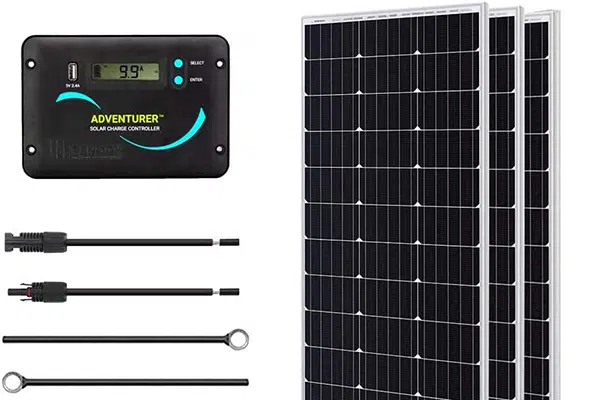A 500-watt solar panel kit will provide you with the tools and experience you need to take the next step towards a 1000-watt solar panel kit and system.
If your goal is to experience the joys of living completely off-grid, and you want to start by powering up a few appliances, then a 500-watt system is a good investment.
On the other hand, if you want power for your boat or RV, and require less energy than a house, then a 500-watt solar kit may be just what you need.
This article provides 500-watt kit options, followed by information needed to decide.
Table of Contents
500-watt Solar Panel Kit Options
All of the manufacturers below provide suitable kits around 400-600 watts.
Renogy 400W 12V/24V Monocrystalline Solar Kit
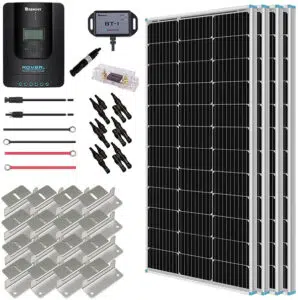
Renogy has numerous 400 and 600 watts kits, but I think this premium 400W kit with MPPT charge controller offers the best value.
Pros
Easy Installation
High Performing Panels
Bluetooth Monitoring
Cons
Technical Service
Accessories vary by distributor
Acopower 500W 12V/24V Polycrystalline Kit
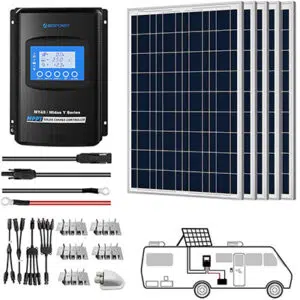
Acopower stands out from many of its competitors due to its responsive service. In addition, this basic Polycrystalline kit is well-made and receives high-performance scores and feedback.
Pros
Good Tech Support
Easy to Install
Well-made Components
Cons
Installation Manual
Rich 600W 12V Monocrystalline Kit
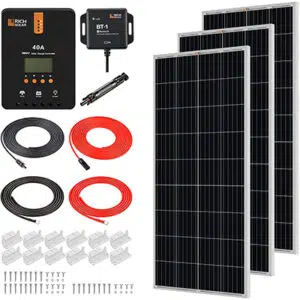
This monocrystalline solar kit by Rich Power receives strong reviews, as do most products they make. In addition, this kit has a perfect MPPT controller and Bluetooth module for monitoring.
Pros
Easy to Install
Well-made Components
Cons
Installation Manual
Inconsistent service
How Much Power Can a 500-watt Solar Panel Kit Produce?
A 500-watt solar panel system will deliver 500 watts to your batteries every hour the sun is directly over the panels. But, of course, we all know that the sun will not always be overhead. Depending on your location and time of the year, you may get an average of 4 -12 hours of sunlight daily.
Your 500-watt solar panel kit can theoretically deliver 2,500 to 6,000 watts of power to your battery bank. In practice, however, you may estimate 50-70% of that since the sun is directly over your panels for about one hour each day. The rest of the time, the sun is at an angle, and your panels will not deliver the full 500 watts.
What Can a 500-watt Solar Panel Kit Run?
A 500-watt solar panel will theoretically provide 500 watts of energy per hour, but there are a few things to consider.
1. Sun Hours – The amount of sun you receive. Depending on location, season, panel tilt, weather, you will receive much more sun at noon than at 4 PM. Y can use an irradiation map to determine your sun hours.
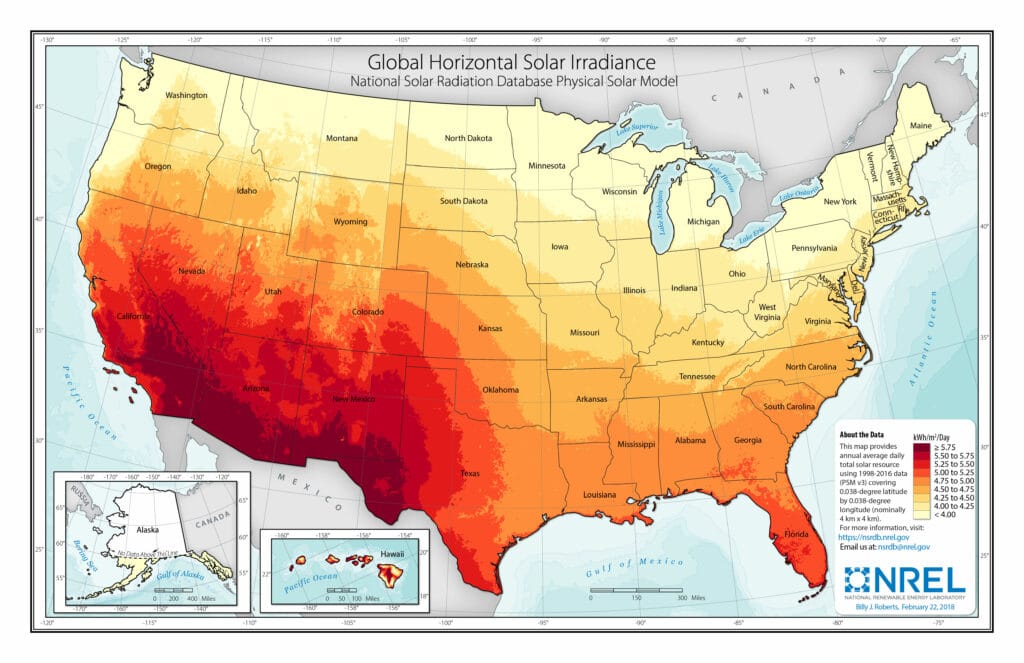
2. Calculation – Let us use 4 sun hours. A 0W panel x 4 sun hours will provide 400 watts per day. Let s assume you lose 25% of your energy to voltage drop in the wires, dirt, or snow on the panels and multiply 400 x .75. This gives you 300-watt energy per day. Finally, since you have 5 panels, multiply 300 x 5 and 1,500 watt-hours of energy per day.
3. Appliances – Now lay out your plan, which should be the first thing you do. How many watts do your lights, microwave, refrigerator, TV, computer, etc., use? Each one should have this information listed. You can look at your electric bill if you are currently on the grid.
How Much Does a 500-watt Solar Panel Kit Cost?
The solar panel kits on this page cost $700 – $1,400, but the cost depends on the components included.
A good example is an Eco-Worthy Kit containing batteries and an inverter. Batteries are expensive, but if you want to run your power at night or cloudy, you will need them.
A full kit you want to run after hours will likely include the components below, so there will be additional costs.
- Solar Panel
- Inverter
- Controller
- Batteries
- Fuses
- Wiring
- Tools
- Brackets
- Panel Frame
Final Thoughts
Once you add up the watt-hours you use daily, you will probably realize you can power a few appliances, but you will not be able to live off-grid without a large bank of batteries. Batteries are expensive but will allow you to collect power when you don’t have sun.
If you want to take your house off the grid immediately, consider hiring a professional to help you determine your needs. This alternative method will probably save you some expense in the long run.
If DIY is your goal, then consider a 500-watt solar kit. This kit is a great start as you dive into solar, and it is also a good kit for boats and RVs that may need less energy. In addition, solar kits will ensure you have the correct components and are a good way to save time and help you learn more about solar energy equipment.
